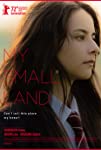Eye For Film >> Movies >> My Small Land (2022) Film Review
My Small Land
Reviewed by: Jennie Kermode

Sarya (Lina Arashi) is 17. She’s getting really good grades at school and her teacher thinks that she has a good chance of getting the university placement she wants, so that she can become an elementary school teacher. She has also managed to find a job in a small grocery shop in Tokyo, which her father doesn’t know about, giving her the opportunity to save up for her future. As part of the Kurdish community, she fears that she will be pressured into marriage – there is already a young man lined up for her – when what she really wants is independence and the chance to live like the native Japanese girls with whom she identifies. Tensions at home suddenly seem like a minor issue, however, when her family’s application for refugee status is rejected, putting them in a position where their rights are severely restricted pending appeal, and where they may have to go back to Turkey – a country in which it would be much harder for her to live an independent life, and where her father would probably be arrested.
Historically, Japan has had low rates of immigration, in large part due to its geographical position and lack of land borders. A declining population has led its government to encourage asylum applications, with most of the population supportive of this, but there are still major problems with how the system works. A rejected application means restricted ability to travel and loss of work permits. Though Sarya can still go to school, her chances of getting into further education look suddenly bleak, and the family is left with no legal means of making a living. Of course, there are always ways in which a pretty girl can acquire money. but this just adds an additional layer of terror to Sayra’s predicament, as she has no idea how to handle such things but needs to look after her two younger siblings. Her father’s despair disturbs and confuses her. Her would-be fiancé offers help, but every option feels like a trap.
Emma Kawawada’s film, which is based on her own novel and her experiences as a Japanese person who looks different from the norm (having a white British father), addresses the crisis into which Sarya and her family are plunged at the same time as exploring other issues around the immigrant experience. We see people frequently ask Sarya where she’s from, often with kindly intentions, complementing her on her looks, yet reminding her that she’s perceived as an outsider. We learn that she was bullied when she first started at school in Japan, and that now her little brother is experiencing exclusion. People in the Kurdish community keep telling her that she is one of them and that they need to stick together, but she longs to be seen simply as Japanese. I conversation with Sōta (Okudaira Daiken), the boy she likes, she remembers wanting to support Japan in the football World Cup “like everybody else,” but feeling as if she wasn’t really allowed to.
Although we see everything through Sarya’s eyes, an additional perspective is offered by her father, who remains proud of being a Kurd, as an immigrant, just as he was proud of it in Turkey – the reason why they originally had to flee. A scar on his knee reminds him of the torture he endured, yet he longs for his homeland and the place where his beloved wife was buried. Although this different identity seems to put him at odds with Sarya, their goals are not as far apart as she has assumed, and this, together with the fact that she’s growing up, sees them gradually come together just as everything is falling apart.
Although Kawawada initially wanted a Kurdish cast, she found her options very limited, because the Kurdish community in Japan is only 2,000 strong and that includes many people currently applying for refugee status themselves, whose situations might be compromised as a result. Arashi is a model with Middle Eastern roots, making her screen début, which is difficult to belief given the quality of her performance in this complex, multifaceted role. Appearing in every scene, she really elevates the film. Though Japanese-born, she draws on her own experience of being treated as gaijin, clearly conscious of what the film will mean to immigrants in Japan and elsewhere. As her own family members play Sarya’s family, the chemistry between them runs deep.
Kawawada’s feelings about the unfairness of the asylum system are clear, and there’s a revelation about that system, towards the end, which will make even the most conservative viewers gasp in horror. None of this is allowed to overwhelm the human story at the centre of the film, however, and it is handled with rare skill and insight. Part of 2022’s Fantasia International Film Festival and Edinburgh International Film Festival selections, this is a small film likely to have a big impact.
Reviewed on: 25 Jul 2022
















